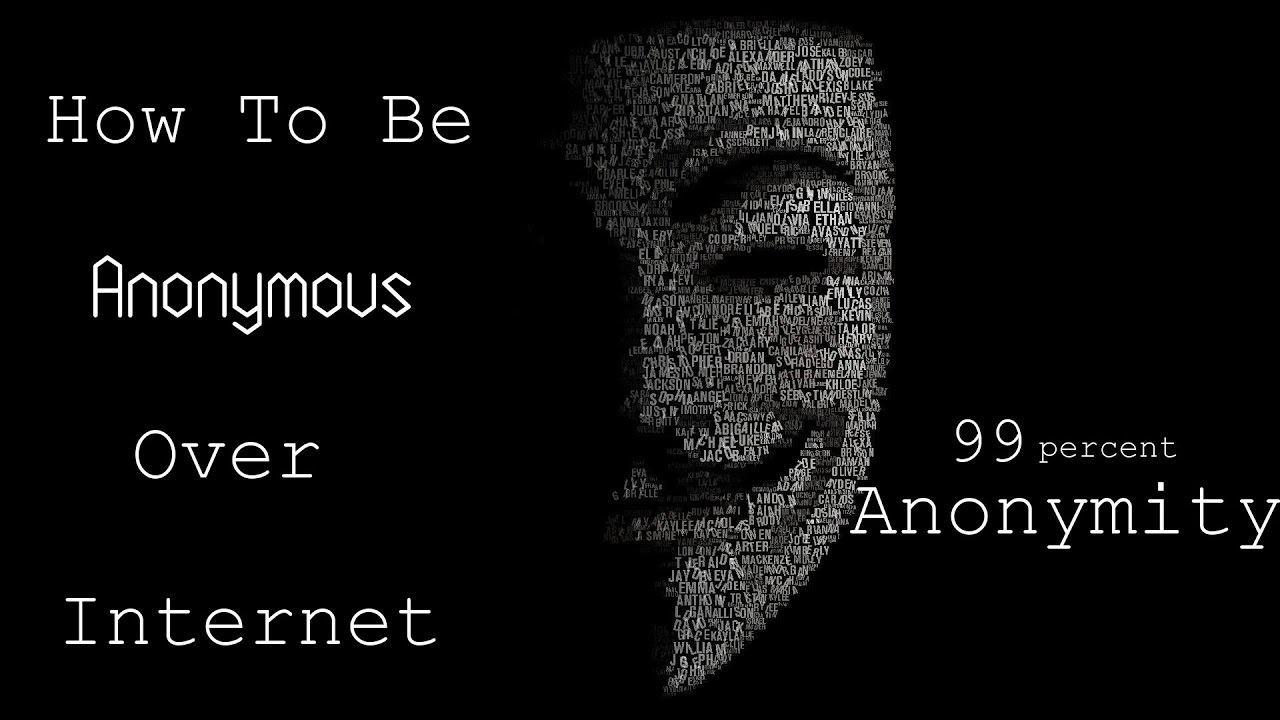Table of Contents
- How to Hide Completely Be Anonymous on the Internet
- Recommended Privacy Tools
- How to Clear Existing Identity Details Online
- Thoughts on Hiding Your Identity Online
Can you be anonymous on the internet at all? Do you know how to be completely anonymous on the internet? Is it possible to hide your identity online? These and many more questions undoubtedly trouble our society today. Either data security breaches are fixed, or they escalate into threatening problems in internet life.
Once upon a time, there used to be what is called ‘anonymity.’ However, things changed with the emergence of top networks such as Facebook, Google, Twitter, etc. This has led to data leaks that result from system hacks, data protection failures, a company’s greed to sell users’ details for money, etc. The main problems associated with exposing your identity online are that hackers or cybercriminals will manipulate the information, sell the information for spam messages, or possibly blackmail the life out of you with the exposed identity.
Let me assist you in getting rid of your identity online by showing you how to hide your identity online.
Bonus: I will teach you how to erase any ‘already-entered’ information about yourself on the internet. This means that I will not only expose how to be completely anonymous on the internet but will expose how to retrieve your original details already available online.
How to Hide Completely Be Anonymous on the Internet
Having highlighted the dangers of an exposed identity, let’s see how to hide your identity online to prevent dangers.
Hiding your identity online is easy
- Use VPN
VPN is an acronym for Virtual Private Network. It must prevent the receiving servers from ascertaining your location. This way, everything about your location is made impossible for the internet to detect. If you want to know how effective this could be, use any modern browser to search for anything using the Google search engine. Scroll to the bottom of the page, and you’ll discover that even Google reads an incorrect location for you.
Moreover, if you’re in a location blocked from enjoying certain services, the VPN will allow you access to it for free. Some manufacturers offer paid or premium services, which I recommend for optimum personal data protection. Of all the ways to be completely anonymous on the internet, using a VPN is the most practiced.
Here is my recommended VPN, which I use to make sure I hide my identity while surfing the internet. Never expose yourself again to informants.
- Go Incognito
You must have come across a setting labeled ‘Incognito’ while going through your browser. Well, this option instructs a user’s browser to delete any browsing history instantly. It is not so much of a method to stay anonymous online, but it helps a lot. How incognito mode helps is that it makes sure that no malicious software accesses your browser history.
If any malicious software gains access, it may extract vital data such as passwords and stuff that you like. It will forward this info to its manufacturers, who will either target a particular advertisement at you or sell the data for money.
- Mind the Plugins
There are lots of tempting plugins available on browsers such as Chrome, Firefox, and Opera. The plugins are often accompanied by good descriptions that promise to do nothing with your data.
However, these plugins anonymously collect every data entered directly on its path or any other path or location in the browser. Such data could be your name, date of birth, hobbies, location, and as much as it can take. When such data departs from the computer or mobile device, it is monetized and could victimize an individual in any way.
There are ways to know a good plugin, and they are
- Check their recommendation
- Check for the Number of Downloads
- Read Reviews
- Avoid Google
Avoid Google if you intend to stay anonymous. A good way to be completely anonymous on the internet is to dump personal data requesting networks. Apart from Google, there are a few others that are insincere. What impresses me about Google is that they are a sincere company.
They inform a user of every personal data access and give reasons supporting why they must access such information. In truth, some of the information required by networks such as Google is always important to serve you better.
- Abandon Http Websites
Time and time again, internet users are being warned from entering details or even using any website without an SSL certificate. It is very unsafe to carry out data exchange on such websites to prevent your info from being stolen. Whether such a website belongs to your bank, a trusted company, Facebook, YouTube, etc., avoid and do not perform any activity on it until it changes to HTTPS.
To know whether a particular website uses HTTP or HTTPS, look towards the top left side of the display screen and click on the URL. Move the cursor backward and confirm whether it is HTTP or HTTPS. Most modern browsers now save internet users stress by marking such a website as ‘unsafe.’
- Use Tor
The Tor browser is like a VPN but offers several other false IP address features. The services rendered by Tor tend to be the most trusted in the world for any activity or for anyone who intends to stay hidden on the internet. Download the Tor software, fill in the necessary fields (if required), connect and do whatever you wish with protection from data thieves online.
Note that Tor protection does not extend to the personal details you input on various platforms. What Tor does is to block any tracker, government or nongovernment, from figuring out where your computer is visiting from. As earlier stated, you could visit any restricted platform by switching your IP to the countries they support. Isn’t technology just interesting?
Please Note: Using TOR requires a lot of internet data and connection. So please make sure that you have enough data before using the TOR browser.
Hidden identity on the internet
- Transact Online Using Another Person’s Account
If we could dodge any platform easily by not using the correct details, payment platforms would be the most difficult. One of the reasons why it will be difficult is because of the banking feature called authentication. Recall that once you are about to create a bank account, you are required to submit your thumbprint data equally.
Failure to do so would mean an incomplete registration. On this note, to successfully avoid exposing your details to the bank, create such an account using another individual. Also, the disadvantage of using another individual is that if a phenomenon like death befalls them, it will be difficult to retrieve the money. Of course, you will be required to make some personal data submissions.
Banks are fond of updating customers frequently to keep their users away from being victimized. Signing up directly would mean giving these details to them and having to receive messages which could sometimes turn out to be spam. What I’m insinuating is that for every online transaction, you must use another person’s account to trade.
- Restrict Apps
Gone are the days when consumers had no control over the activities of their mobile phones. In Android phones, for instance, beginning fully from Android KitKats, users can decide what function an installed application can perform. Some of such modifiable functions that have to do with user identity include:
- App access to the location
- Access to the contact list
- Reading of mobile phone messages
- Access to front and rear cameras
- Voice recorder access (some apps anonymously record what you say)
Restricting apps from gaining access to any of the functions, as mentioned above, reduces the chances of personal data theft. Do not ignore to block malicious applications from stealing your data altogether. These features are equally accessible on iPhones, enable or disable the functions, to remain anonymous online. , go to apps under your phone’s settings to allow these instructions.
- Use Fake Details on Several Networks
Using correct details on any social or nonsocial network is good, but not when a company seizes the opportunity to take advantage of your information. The networks to use fake details do not exclude the likes of Facebook, Twitter, etc. Although these networks request permissions, there may still be anonymous data retractions that you are not aware of.
Recommended Privacy Tools
There are a few privacy-bound tools that help to stay below the radar. Here are a few of them to keep your identity away from the internet.
- Tor browser
- VPN apps available on the Play Store or Apple App Store
- Proxy Servers
- Redirect checker
- Adblocker
- Location block plugins
- Incognito browsers
How to Clear Existing Identity Details Online
Clearing an existing identity online is very simple. Once, I signed into a spam website unknowingly. A few days later, my official mail address suffered spam mail from various sects of internet fraudsters and criminals. Today, I have a spam-free email after doing the following:
Check the Link Embedded in the Spam Mail
Most of the spam emails you receive, it is either your data on a particular site being sold to spammers, or it’s an attempt to draw traffic or hack your account. Stop this by checking the entire email for the link pointing to such a website. Go to the website and find the option to ‘Delete’ or ‘Deactivate’ accounts. Most websites will prevent you from deleting your account. However, you could get around this by editing the registered mail or entering an invalid ID to null the account. Save the ID and exit.
Unsubscribe from the Email
Some websites allow you to ‘unsubscribe.’ Hit the button, and you’re free.
Note: If possible, delete your details on such a site before unsubscribing.
Mark Such Senders as Spam
When there are no options to unsubscribe, don’t panic. To be sincere, you can never do away with such emails permanently. Still, you can instruct your mail provider to redirect such messages to a spam folder or permanently block the servers from reaching you with fraudulent messages.
Thoughts on Hiding Your Identity Online
This article has answered the question, “Can you be anonymous on the internet.” Although it is smart to stay anonymous, it is also disadvantageous to remain anonymous online.
It is recommendable to go anonymous occasionally rather than for life. The principal reason is that most activities we do online now require our details to function.
Meanwhile, consider sending anonymous emails to hide your presence on the internet

